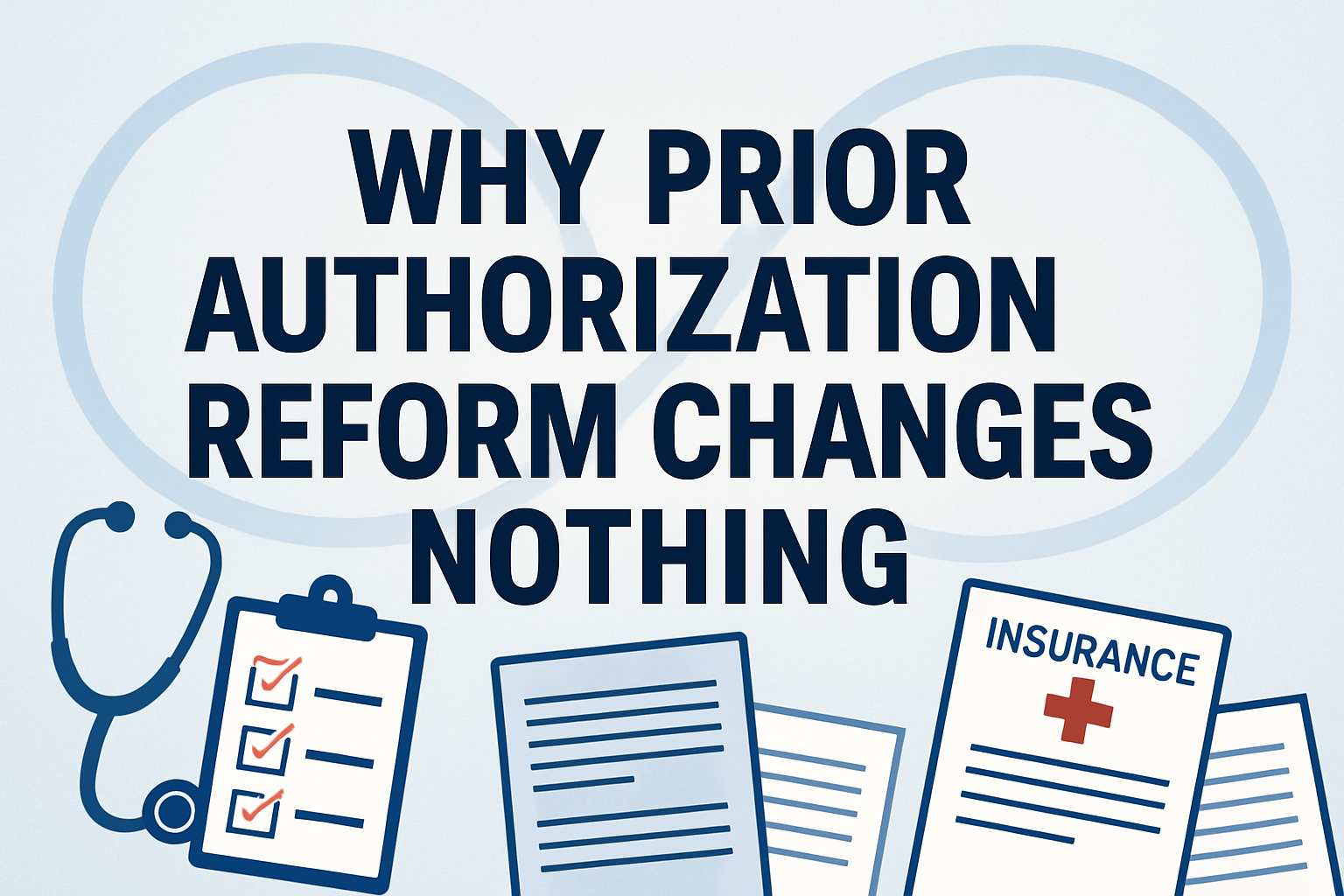
Why Prior Authorization Reform Changes Nothing
Everyone's celebrating the wrong thing.
The headlines are buzzing about prior authorization reforms coming in 2026. Standardized electronic submissions. Real-time decisions. Public dashboards tracking compliance.
It sounds revolutionary. It's not.
I've lived through the prior authorization nightmare in my own practice. I've watched it slow down patient care, create endless administrative work, and shift clinical decisions to people who have never examined the patient.
The frustration is real for everyone except the insurance provider.
The Voluntary Compliance Illusion
Here's what nobody wants to admit about these reforms: they're voluntary.
Insurance companies won't follow through. They get "qualified" people to review cases and pay them to deny or delay care. Meanwhile, patients continue paying monthly premiums while insurers take their time.
The consumer keeps paying but the insurance takes their time.
This same delay tactic happens when paying providers. Insurers dispute payments, create administrative headaches, and drag out reimbursements. Practices complete 39 prior authorization requests per physician per week, costing approximately $29,000 annually per physician just for processing.
The only person who wins here is the insurance company.
Even Dr. Oz admitted that if voluntary compliance fails, "there are government opportunities to get involved." That's bureaucratic speak for "we know this won't work."
The Hidden Opportunity Nobody Sees
But here's what creates a massive opportunity: most practices will wait for these reforms to maybe help them someday.
Smart providers won't wait.
Now is the time to move to cash-based services. Patients have to wait for care they already paid for in their insurance agreements. Waiting on care costs them time out of work, memories with loved ones, and extended pain.
Cash-based systems move the power back to the provider.
You get to dictate care as needed with real-time decisions using programs proven to work. I see this transformation happen constantly with the practices I work with.
Breaking the Abusive Relationship
Most providers already know it's time to change. They're frustrated and ready.
But they have fear that leaving insurance will cost them new patients, so they obey insurance company demands.
It's like an abusive relationship. You get battered but are too scared to leave.
Cash-based systems break this cycle. They move power back to the provider to give quality care in a timely manner without insurance companies dictating or slowing care.
The transition fear is real but misplaced.
What Actually Happens in the First 90 Days
Most practices see increased revenue and patient satisfaction within 30-60 days of implementing the right systems.
The key is not tearing down what works. Instead, we quickly fix what's broken and bolt on cash services while training both doctors and staff to deliver smooth, clear solutions to patient needs.
We also solve the affordability problem that keeps providers trapped.
Through partnerships with financing companies, we make quality care work for nearly any budget. After all, if you don't have your health, can you work? Can you enjoy life?
The best investment you can make is in yourself.
This creates an ecosystem where low-income patients get the care they deserve without providers losing the value they deserve.
The Strategic Timing Advantage
Simple advice: Start offering cash services now.
Don't wait to see what may be helpful from the reform. Chances are the changes won't be what you truly need, and they certainly won't come right away.
Cash-based services will become a necessity with increasing overhead costs and lower reimbursements.
Even if authorizations become easier, what happens when reimbursements go down? Does it make sense to stay in the same cycle that's destroying your practice and personal life?
It doesn't.
The data backs this up. Nearly all Medicare Advantage prior authorization appeals result in overturned denials, exposing the systematic nature of initial denials. Insurance companies profit from saying no first, knowing most providers won't fight back.
The Mindset That Changes Everything
For things to change, you have to change.
Don't put your success in the hands of large corporations that don't care about clinical outcomes.
The practices that successfully break free from insurance dependency share one trait: they commit to change. They don't just talk about offering cash alternatives; they actually implement them.
You don't have to quit insurance cold turkey. Transition over time to fully cash by offering solutions.
But understand this: change is coming whether you're ready or not.
Don't miss the bus.
The Real Reform Starts With You
While everyone waits for 2026 reforms that may never materialize, forward-thinking practices are already building their independence.
They're creating systems where patients get immediate care, providers make clinical decisions without interference, and both parties benefit from transparent, fair pricing.
The prior authorization reform everyone's talking about addresses symptoms, not the disease.
The real reform happens when you stop asking permission from insurance companies to treat your patients.
It happens when you build systems that put patient care first, not insurance company profits.
The opportunity window is open now. Cash-based practices report better patient interactions and more satisfying practice development despite initial volume concerns.
Most practices will wait for permission that never comes.
The question is: will you be one of them?
Break the cycle. The power to change your practice has always been in your hands.
You just have to decide to use it.
